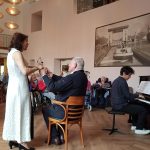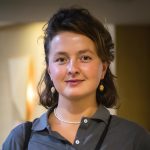Gesprek met Ardashes Agoshian
Ardashes Agoshian is de dirigent van Zwaluwkoor Amsterdam. We vroegen hem hoe hij bij het Zwaluwkoor kwam, en hoe hij het als dirigent vindt. Zijn antwoorden gaf hij in het Engels. Om de zeggenskracht van zijn woorden zo veel mogelijk in tact te laten, is onderstaand artikel in het Engels.
“My name is Ardashes Agoshian. I have the Turkish nationality, but I am Armenian. I was born in Istanbul, and grew up in an Armenian community. I am a musician for 42 years now and I started conducting when I was 27 years old. Since 2020 I am the director of Zwaluwkoor Amsterdam.
Conducting the Zwaluwkoor is a kind of social responsibility project for me. You’ll find people from different countries in the choir. We are sharing the same soul, with different languages. Music actually, is a local thing; feelings are universal: love is love, passion is passion. But, we are stirring with different words, maybe with some different colors, different nuances. But still, love is love for all of us.
Conducting the Zwaluwkoor is a bit different from a regular choir. We have some special choir members, with different levels, cultures. First of all, I have to explain what it means to sing in a choir. What is a choir, what is singing, how can we combine it, how can we sing together, how can we not sing together?
To me, conducting the Zwaluwkoor sparked my different feelings, not only musical, but also social. I believe that I can give something to this choir and I can learn from this choir. It is a basic teaching model. One person teaches, and two people learn: teacher and student. Language is the biggest challenge while conducting the Zwaluwkoor. Because every language has its unique microtones. Unique sounds and imitating those sounds is so difficult for us.
To people who are considering to join the choir I would say: if you want to experiment with your feelings, expressed in different languages, with a bit of a different angle, please come join us. And, we will share our joy with you.
For sponsors and partners it is good to know that our choir has some different roles. First of all, of course, a social role. As a choir, we have different faces to show to the audience, with different languages and cultures. We are also supporting different cultures. And we show to the public how we can work together. For example, we have Ukrainian and Palestinian members, and every concert friends are invited. Palestinian friends and members will learn some Ukrainian elements, some Armenian elements, Arabic elements, Moroccan elements. So, through the choir a bigger audience is connected. And that is what we are aiming for with the Zwaluwkoor.”


